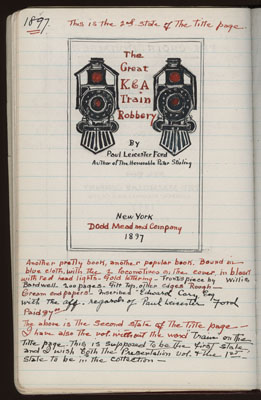Collecting Journals: Volume XI, 1893-1900
Volume XI must have been a joy for Lillian to compile; it contains entries for several of her favorites books as well as a number of stories on how she obtained various volumes. Among those she particularly appreciates are Eugene Field’s The Love Affairs of a Biliomaniac, Henry James’s The Spoils of Poynton and “The Altar of the Dead” from Terminations, and Kate Chopin’s The Awakening and “Desiree’s Baby” from Bayou Folk. She comments on these stories both as a reader experiencing enjoyment, and as a critic assessing their contribution to American literature. She writes, for instance, “I remember reading a contribution in a literary journal, many, many years ago, in which the writer referred to ‘The Altar of the Dead’ as one of the three most ‘exquisitely beautiful short stories in English,’ placing it first and such has been my estimate, since first reading this story—a view held unwaveringly for now perhaps 30 years.”
The journal also contains hints of current events in the 1940, mentioning here World War II. In her entry for The Honorable Peter Stirling, by Paul Leicester Ford, she mentions how one of her favorite bookshops is going out of business: “I bought it in January 7, 1942 from The Collectors Bookshop. They suddenly going out of business, closing for ‘the duration.’ […] I wished this book, and also wished to buy something from them. Nice men, and I am sorry they must close.”
As Lillian writes of Thomas Nelson Page’s Red Rock she comments upon both the difficulties of creating the journals and on the excitement of collecting. On the first she states, “Those top two lines are too close to-gether. They should be another line apart. So easy in copying to make mistakes.” She tells the following story of how she purchased the novel (a point is something that definitively identifies a certain edition of a novel): “I saw it in a catalogue of Sam Loveman’s, ‘with a long letter from the Author inserted.’ I drove down Fifth Ave. to buy it. ‘Sorry Mrs Taylor, but it is sold.’ ‘Oh I am sorry. Has it the Point?’ ‘Point, should it have a point?’ ‘Yes, indeed.’ Sam was worried. ‘Well it has gone, right or wrong.’ ‘No, it is wrapped, but hasn’t been mailed,’ said his assistant. Sam went for it, opened it, and put it in my hands. It was right. I certainly craved it. As the letter to the man in Chicago was also unmailed, the book was given to me, and he never knew how nearly he owned my precious book.”

